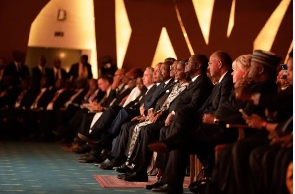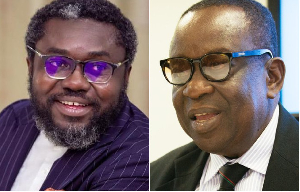The absence of strong Ghanaian institutional representation at the recently concluded Africa CEO Forum (ACF) Annual Summit has left a sour taste in the mouths of some participants – who believe it was a missed opportunity to have forward-looking dialogue in a neutral environment as well as promote networking and glean lessons from what was a logistics masterpiece.
The Summit saw more than 2,000 invited guests converge in Abidjan, the capital city of next-door western neighbour Côte d’Ivoire on June 5 and 6.
Themed ‘Succeeding despite crises – from 300 to 3000: Accelerating the Rise of African Champions,’ the World Bank and Juene Afrique-z event centred on discussing tactics to expedite regional economic integration and implement measures to boost the number of African ‘champions’.
These champions are defined as companies with an annual turnover exceeding US$ 1 billion. The objective is to increase their count from the existing 300 to 3,000, ultimately transforming the continent and asserting Africa’s pride and sovereignty on the global platform.
Speaking with the B&FT on the sidelines, a Partner at accounting and professional services firm KPMG responsible for Risk Consulting and Compliance involving services in IT Advisory, Andrew Akoto, said he was looking forward to engagements with the Social Security and National Insurance Trust (SSNIT) and Ghana Investment Promotion Centre (GIPC), which were registered for the summit.
Attempts to confirm reasons for their non-participation proved futile prior to filing this report.
“What I wanted was an opportunity to engage some of the key stakeholders who manage the infrastructure that drives our investment decisions such as GIPC, which was registered; but I did not see them, SSNIT as well. And these are some of the most powerful institutions that could have made a difference to the conversation,” he said.
“Even if you look at the conference itself, the sheer complexity of the logistics and organisation, what prevents us as a nation from using some of these platforms to showcase our country? The president of Cote d’Ivoire is not doing this for nothing; at the end of the day, it is building local capacity and it helps with transaction dealerships, brokering deals with local entrepreneurs and has positive returns for the economy,” Mr. Akoto added.
He however stressed that while such programmes could see an influx of foreign capital, they are in no way substitutes for building local capacity.
“Others have grown by investing in the agro-economy and empowering local businesses. If you contrast the situation in Ghana with all the potential in agric, we seem to take one step forward and two steps backward. At the heart of capital mobilisation, we are talking about savings; who is going to bring that capital for mobilisation but the indigenes? However, we have had a hiccup over the past few years with the financial sector reforms; and lately the domestic debt exchange has dampened confidence to bring their money to the banks.
“How do we grow in such a world? We must get down to basics and be very intentional about putting in place mechanisms to grow local businesses, there is no easy fix. Patient capital must be homegrown. We must stop paying lip-service to building homegrown capacity,” he explained.
Another participant, who was there at his own expense and elected to speak on the condition of anonymity, said it perhaps points to the waning goodwill the nation has before its peers.
“I cannot be 100 percent certain on this point, but it just seems to me that in prior years when Ghana was the toast of regional nations despite the francophone flavour of the summit, it would have been impossible for a strong delegation not to be present,” he said.
“At this point, we need to start looking at the capacity of our hotels, event centres and overall logistics architecture – and look for ways to host some of these events with the remaining goodwill that we have,” he added.
Deals, deals and more deals
Among the number of deals announced at AFC 2023 was the host Côte d’Ivoire signing three memoranda of understanding (MoUs) for public-private partnerships, amounting to a combined value of new deals worth US$450million.
The first agreement involves the construction of a cashew processing plant with a capacity of 200,000 metric tonnes per year. The second agreement focuses on an integrated development project for a 900-hectare plantain/banana plantation, which includes the employment of 190 young farmers and establishment of a banana-chips processing factory. Lastly, the third agreement pertains to the construction of a building complex consisting of three towers at the Ivorian Press Agency site.
These agreements, the Ivorian government said, highlight its commitment to sustainable economic growth, job creation, and private sector development, aiming to position Côte d’Ivoire as a preferred destination for international investment and a leading industrial hub in the sub-region.
The Cameroonian delegation led by Prime Minister Joseph Dion Ngute and Minister of Economy, Planning, and Regional Development, Alamine Ousmane Mey, showcased the central African nation’s major and priority projects.
Aligned with SND 30, Cameroon’s National Development Strategy for the period of 2020-2030, the projects emphasised infrastructure development – particularly in the areas of roads, railways, ports, energy, and agro-processing. The presentation aimed to attract investors from Europe, Asia, and America, and covered multiple sectors with an investment portfolio totalling millions of US$ across nearly 10 development areas.
In what was undoubtedly the biggest private sector development, the International Finance Corporation (IFC) announced its largest-ever investment in northern Nigeria – providing a financing package alongside African and European partners to BUA Cement Plc, the second-largest cement producer in the West African country.
The US$ 500 million package is aimed at supporting the development of two new energy-efficient cement production lines, generating up to 12,000 direct and indirect jobs.
The financing includes loans from the IFC’s own account and syndication partners such as the African Development Bank, Africa Finance Corporation, and the German Investment Corporation (DEG).
The investment will enable BUA Cement to construct two plants in Sokoto State, Nigeria, utilising alternative fuels and solar power, with a total annual cement production capacity of approximately six million tonnes.
“We are pleased to join with our partners to support BUA with an investment that will boost industrialisation, create jobs and deliver economic growth in northern Nigeria, a region with significant economic potential,” said IFC’s Managing Director, Makhtar Diop.
The project aims to strengthen the construction industry, promote economic growth and create sustainable development opportunities in the region. Additionally, the investment supports IFC’s strategy to foster diversified and inclusive growth, job creation, and sustainable practices in Nigeria, where it has an active investment portfolio of US$ 2.3 billion.
Business News of Monday, 12 June 2023
Source: thebftonline.com













